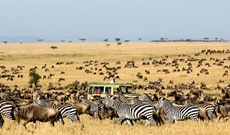Drought-hit Zimbabwe seeks to sell off wildlife
07 May 2016
Drought-hit Zimbabwe has invited local farmers and private game rangers to buy wild animals as it destocks national game reserves to save fauna from starvation.
 Parks and wildlife authority spokeswoman Caroline Washaya said on Wednesday that it has asked individuals and private game keepers to step in and buy wild animals ''in the light of the drought''.
Parks and wildlife authority spokeswoman Caroline Washaya said on Wednesday that it has asked individuals and private game keepers to step in and buy wild animals ''in the light of the drought''.
She did not have details of the species or numbers of the animals up for sale or their cost, but the southern African country's 10 national parks are famed for their huge populations of elephants, lions, rhinos, leopards and buffalos.
The cash-strapped country has been battling to reduce its animals - especially elephants - whose population is more than twice what the parks can accommodate. The drought has also exacerbated an economic crisis that has largely been deserted by foreign donors since 1999.
A drought across the region has left more than 4 million Zimbabweans needing aid and hit the crops they rely on for food and export earnings, from maize to tobacco.
A notice in a state newspaper invited ''members of the public with the capacity to acquire and manage wildlife'' to make offers to buy.
Selling the animals would give some of them a new home and ease financial pressure on the parks authority, which says it receives little government funding and struggles to get by on what it earns through hunting and tourism.
"In light of the drought ... Parks and Wildlife Management Authority intends to destock its parks estates through selling some of the wildlife," the authority said in a statement.
It asked interested Zimbabweans to get in touch and did not mention foreign buyers. Parks authority spokeswoman Caroline Washaya-Moyo would not say whether the animals could be exported or how many it wanted to sell.
"We do not have a target. The number of animals depends on the bids we receive," she said.
Zimbabwe has in recent years resorted to exporting elephants to countries such as China in a bid to raise funds and cut the ballooning population.
There was no immediate comment from the wildlife groups that protested loudly last year when Zimbabwe exported 60 elephants, half of them to China, where the animals are prized for their tusks.
The drought has left at least a quarter of the population in need of food aid and President Robert Mugabe in February declared many parts of the rural areas in a 'state of disaster'.
The drought has further strained national parks that are already burdened by the growing numbers of species such as elephants.
The parks authority relies on donations from well-wishers to supply water for the wildlife, and volunteers to carry out patrols to ward off poachers.
The export of elephants to China angered international animal rights groups, but some local conservationists back government plans to sell off wildlife.
Jerry Gotora, a conservationist and former chairman of the parks department, said: '
''Zimbabwe is facing one of its worst droughts ever, even worse than 1992 when thousands of wildlife were decimated.
''All our national parks are in the driest regions and the biggest question as we experience this drought is 'who is going to feed the wildlife and who is going to give them water?''
About 54,000 of Zimbabwe's 80,000 elephants live in the western Hwange National Park, more than four times the number it is supposed to hold, the agency says.
The drought is expected to worsen an already critical water shortage in Hwange, which has no rivers and relies on donors to buy fuel to pump out underground wells.
The privately-owned Zimbabwe Independent newspaper reported in February that Bubye Conservancy, a private game park in southern Zimbabwe, could be forced to kill 200 lions to reduce over-population.
Many hunters have stayed away, the paper quoted Bubye general manager Blondie Leathem as saying, since the furor over the killing of Cecil, a rare black-maned lion, by a U.S. dentist last year.


















